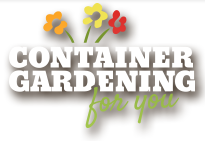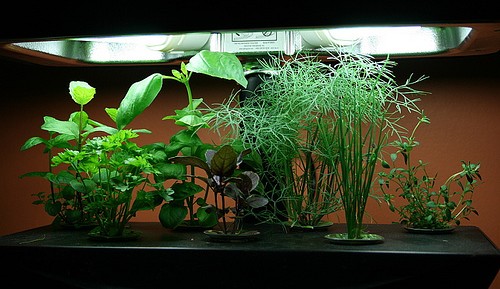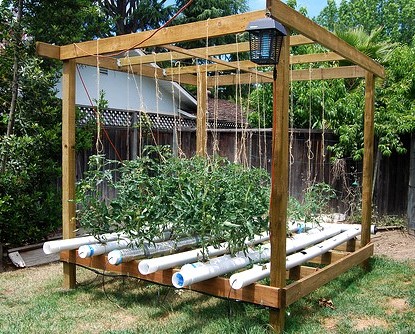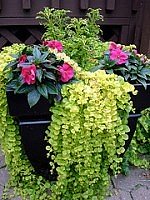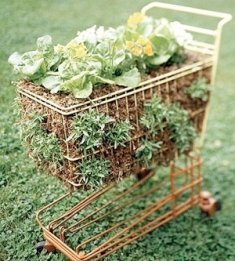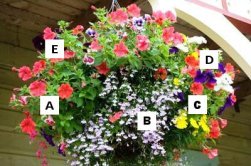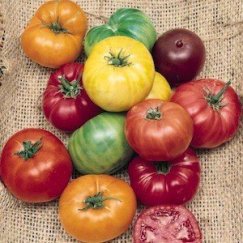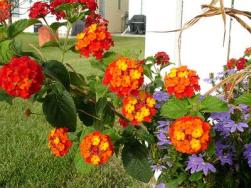Hydroponic System
Hydroponic System: Wondering, how does hydroponics work? Learn about the best hydroponic system plans, hydroponics nutrients , and even learn home made hydroponics.
Hydroponics is often defined as "the cultivation of plants in water." Research has since determined that many different aggregates or media will support plant growth; therefore, the definition of hydroponics has been broadened to read..."the cultivation of plants without soil."
Growers all over the world are using hydroponic techniques due to the lack of a large water supply or fertile farmland. Home gardeners have used hydroponics on a smaller scale to grow fresh vegetables year round, and to grow plants in smaller spaces, such as an apartment or balcony.
Greenhouses and nurseries grow their plants in a soilless, peat or bark-based growing mix. The nutrients then are applied to the growing mix through the water supply. Therefore, this is also a type of hydroponics.
Photo Credit: Handolio
Advantages For The Home Gardener
Soilless gardening offers many advantages to the home gardener. Since a sterile medium is used, there are no weeds to remove, and soil-borne pests and diseases are minimized, if not eliminated completely.
Properly grown hydroponic plants also are healthier and more vigorous because all of the necessary growth elements are readily available. The plants can mature faster, yielding an earlier harvest of vegetable and flower crops. A win-win situation!!
Hydroponic gardens, such as theaero garden, use less space since the roots don't have to spread out in search of food and water. This small space requirement makes hydroponics ideal for home gardeners, and it makes better use of greenhouse space.
Automation
The big advantage to hydroponics is the ability to automate the entire system with a timer. Automation reduces the actual time it takes to maintain plant growth requirements. Automation also provides flexibility to the gardener as one can be gone for long periods of time without having to worry about watering the plants.
Photo Credit: kkimpel
Plant Requirements
Growth Requirements
Whether a plant is grown in soil or a soilless medium, there are many factors affecting plant growth and productivity. All plants require nutrients, water, light, and air to grow. A plant grown in soil obtains nutrients and water from the soil, when available.
With hydroponics, because water and nutrients are always available, the plant is never stressed. Sunlight and air are readily available in an outdoor hydroponic system. However, for hydroponic grow boxes , one must provide an adequate light source and good air circulation!
Metal halide lamps, sodium vapor lamps, grow-lights, or fluorescent lights used in conjunction with incandescent light bulbs provide adequate light.
Plant roots must have oxygen available to keep them alive. Healthy roots (which are white in color) are responsible for the uptake of all nutrients for the plant. If the roots die, it is impossible for the plant to survive, even if the plant growth requirements are met.
Air circulation around leaves is important since it mixes the air and allows the plant to draw out the carbon dioxide necessary to carry on photosynthesis. Air circulation also helps prevent fungal diseases caused by moist, stagnant conditions. Indoor units often have a small fan to circulate the surrounding air.
Hydroponic System Summary
Several developments in the past few years have made hydroponic gardening easier for the home gardener. Newer systems are simpler to set up and operate.
An increase in suppliers of hydroponic products means equipment and special fertilizers are more easily obtained by the home gardener. The use of lightweight plastics in the newer systems makes hydroponics less expensive and a better investment than older systems that used heavy, concrete benches.
Hydroponic systems are available in a variety of sizes and prices. Find My Recommendations For Kits Here. They're available from many suppliers, and some hydroponic systems can be built easily at home from materials found at hardware stores and fish supply stores. Numerous hydroponic and soilless gardening books can be found in local libraries and bookstores.
Authors of above are: Ruth Sorenson, Extension Technician, and Diane Relf, Extension Specialist, Horticulture, Virginia Cooperative Extension, Virginia Tech, and Virginia State University.
